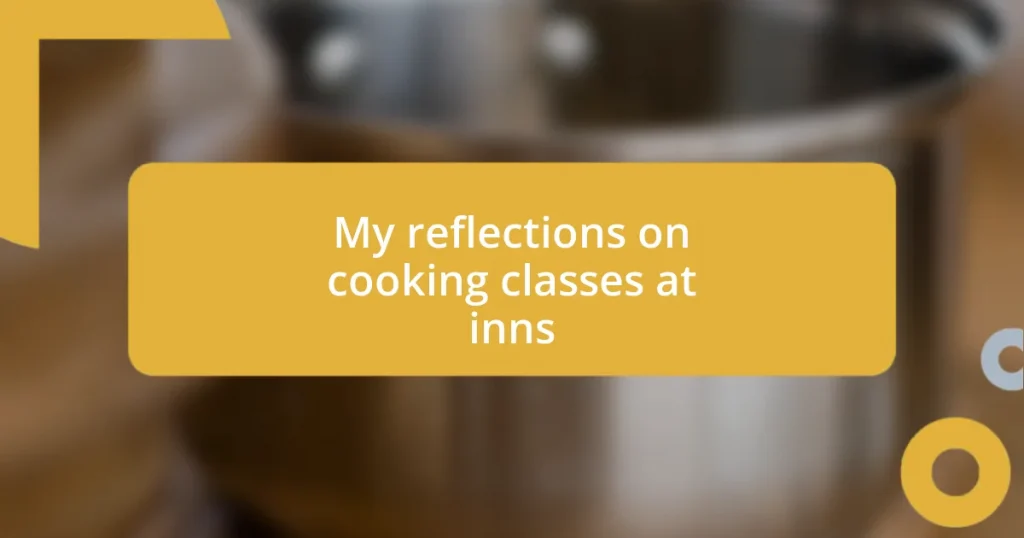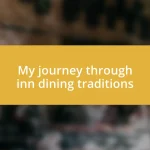Key takeaways:
- Cooking classes at inns foster a personal connection to culinary traditions, emphasizing local ingredients and shared experiences among participants.
- Key skills learned include knife techniques, seasoning, and plating, which enhance both confidence and the overall dining experience.
- Embracing creativity and asking questions enriches the learning journey, allowing participants to move beyond recipes and discover their unique cooking styles.

Introduction to Cooking Classes
Cooking classes at inns offer a delightful way to explore culinary traditions while immersing oneself in a relaxing atmosphere. I remember stepping into a cozy kitchen at an inn tucked away in the mountains, where the aroma of simmering herbs welcomed me like an old friend. Isn’t it fascinating how food has the power to evoke memories and emotions?
Participating in these classes allows for learning not only new techniques but also understanding the story behind each dish. For instance, I recall a joyful moment when I tried my hand at pasta-making, and the instructor shared tales of her grandmother’s recipes passed down through generations. Doesn’t it make cooking feel more personal when you appreciate the history behind it?
Beyond just stirring pots and chopping ingredients, cooking classes provide an opportunity to bond with fellow guests. I’ve made lasting friendships while kneading dough or experimenting with flavors. Have you ever experienced that unique camaraderie that forms over shared meals and laughter? It’s a beautiful reminder that cooking is not just about sustenance; it’s about connection.

Benefits of Cooking at Inns
Taking cooking classes at inns offers a multitude of benefits that go beyond just learning new recipes. One of the most significant advantages is the intimate setting. I recall one particular class where the kitchen felt like a warm embrace, filled with laughter and chatter. This cozy environment makes it easier to ask questions and learn, transforming cooking from a task into a shared experience. Isn’t it wonderful how a simple meal prep can become a bonding moment?
Moreover, cooking at inns often emphasizes local ingredients and regional recipes, which connects you more deeply to the culture. I remember discovering the secrets of herb-infused dishes made from ingredients harvested right outside the inn’s door. The fresh flavors left such an impression on me that I still try to replicate those dishes at home. This connection to local foodways can truly enrich your cooking.
Lastly, the personal attention offered in smaller class sizes is a compelling benefit. I found that instructors were not only chefs but also storytellers, eager to share tips that you wouldn’t find in a cookbook. With their guidance, I learned to appreciate the nuances of each flavor. Isn’t it incredible how much more rewarding cooking becomes with a mentor by your side?
| Benefit | Personal Experience |
|---|---|
| Intimate Setting | Warm, inviting atmosphere enhances learning. |
| Local Ingredients | Connection to culture through fresh, local recipes. |
| Personal Attention | Instructors share invaluable tips and stories. |

What to Expect in Classes
I’ve discovered that each cooking class at an inn carries its own unique flavor, influenced by the local culture and the chef’s personal cooking style. You can expect hands-on experience, which means you’ll be actively chopping, stirring, and plating alongside your instructor. I remember the thrill of my first cooking class, where I found myself deftly flipping a crepe, guided by gentle hands of someone who clearly loved what they did. It’s about immersing yourself in the process, rather than just watching.
Here’s a glimpse of what you might encounter during these classes:
- Hands-On Cooking: You’ll jump right in with practical, guided cooking experiences.
- Cultural Insights: Expect to hear anecdotes about regional ingredients and culinary traditions that enrich your understanding.
- Personalized Instruction: Instructors often tailor their guidance based on your skill level, making learning more accessible and enjoyable.
- Interactive Environment: You’ll share your cooking journey with others, creating a sense of community and shared experience.
- Tastings: Many classes culminate in a delicious meal, where you can savor the fruits of your labor, often paired with local wines or artisanal beverages.
Each class takes you deeper into the culinary arts, fostering a joyful atmosphere that goes beyond the kitchen. There’s something incredibly satisfying about crafting a dish while surrounded by laughter and the enticing aroma of good food.

Finding the Right Inn
Choosing the right inn for cooking classes can significantly enhance your experience, so it’s essential to do a bit of homework. I always start by looking for inns that offer authentic experiences, often highlighted in reviews. I once stumbled upon an inn renowned for its home-cooked meals prepared in their cooking classes. The moment I walked in, I could smell the rich, inviting aromas wafting through the air—immediately, I knew this was the place I wanted to learn.
Another important factor to consider is the expertise of the instructors. The best classes I’ve enjoyed featured chefs with real-life culinary skills rather than just theoretical knowledge. During one memorable session, our chef not only taught us to sauté but also shared stories about his culinary journey, inspiring us all to bond over a shared love for cooking. Isn’t it amazing how that connection can elevate the entire learning process?
Lastly, think about the size of the class. I personally prefer smaller groups, as they allow for more interaction and personalized feedback. There was a time when I participated in a larger class, and while the energy was fun, I felt a bit lost in the crowd. Those smaller, intimate classes truly gave me the space to ask questions and experiment without the fear of being judged. What’s your learning style? Would you thrive in a cozy setting or a bustling environment?

Essential Cooking Skills Learned
Cooking classes at inns equip you with essential skills that transform the kitchen experience. I’ve learned techniques like knife skills that significantly improved my confidence and efficiency. There was one class where we practiced slicing vegetables—it felt like a rite of passage! Mastering this basic skill not only made cooking faster but also brought a sense of pride.
Another invaluable lesson I picked up was the art of seasoning. I still remember the ‘aha’ moment when our instructor revealed how a pinch of salt could elevate a dish from bland to vibrant. It’s fascinating how something so simple can change the entire flavor profile. I often find myself asking, “Have I seasoned this enough?” when I cook at home, and I’ve found that intuitive sense truly enhances my dishes.
Finally, I discovered the importance of plating, which I initially thought was just fancy presentation. But after experimenting with different plating techniques in class, I realized how it affects the overall experience. One day, I arranged a colorful stir-fry on a white plate and was amazed at how it transformed the meal into something special. How can we share a meal without appreciating its visual appeal? This small detail can make the difference between just eating and truly enjoying a dish.

Personal Reflections and Growth
Reflecting on my journey through cooking classes at inns, I can see how these experiences have shaped my growth in profound ways. I vividly recall the day I nervously stepped into a kitchen filled with unfamiliar tools and ingredients. It was intimidating, yet exhilarating; I felt like an explorer navigating uncharted territory. That first class ignited a passion I never knew I had, and with each session, I’ve witnessed how cooking can transform not just dishes, but also my confidence.
One memorable lesson that stands out was about the power of creativity in cooking. I remember one instructor encouraging us to throw away the recipe and trust our instincts. At first, I hesitated—what if I made a mistake? But bravely, I decided to experiment with flavors and textures. The exhilaration of tasting my unique creation was a revelation, teaching me that cooking is as much about self-expression as it is about technique. Have you ever had a moment where you stepped outside of your comfort zone? Those moments are the ones that truly help us grow.
Over time, I’ve come to appreciate the beauty in the imperfections of my culinary journey. I’ve burned a few dishes and had my fair share of flops, but each mistake has been a stepping stone to improvement. In fact, I often fondly remember the burnt soufflé that turned into an unexpected pancake fiasco! It was laughable at the time, but it taught me resilience and the importance of adapting—key ingredients in both the kitchen and life. Looking back, it’s clear that the challenges I faced in those classes ultimately paved the way for my growth, both as a cook and as a person.

Tips for Future Participants
Embarking on a cooking class journey can be a thrilling adventure. One of my top tips for future participants is to come with an open mind and a readiness to experiment. I recall a fellow student who seemed hesitant to deviate from the recipe during our first session. But when she finally took the plunge and added an unexpected spice, her dish became the talk of the class! It taught me that embracing creativity can lead to delightful surprises. What unexpected flavors have you discovered when you dared to try something different?
Another piece of advice I’d offer is to be engaged and ask questions. I remember feeling shy about raising my hand during a demonstration, but once I overcame that hurdle, I learned so much more! One of my favorite moments came from asking about why we should let certain proteins rest before serving. The instructor shared insights that made such a significant difference in my cooking. Being curious not only deepens your understanding but also fosters connections with the instructors and your peers. Don’t hesitate to pick their brains and soak up their knowledge!
Finally, bring your own personality into the kitchen. The moment I started infusing my dishes with little touches that reflected my tastes—like adding a splash of citrus to a classic recipe—was a game changer. It made cooking not just a task but a joyful expression of who I am. Have you ever thought about how food can reflect your unique story? Embrace that aspect, and you might just find that cooking becomes an even more fulfilling experience.















